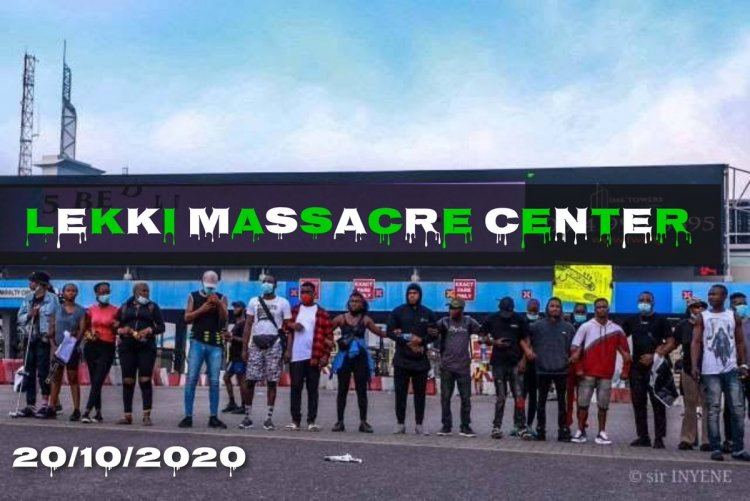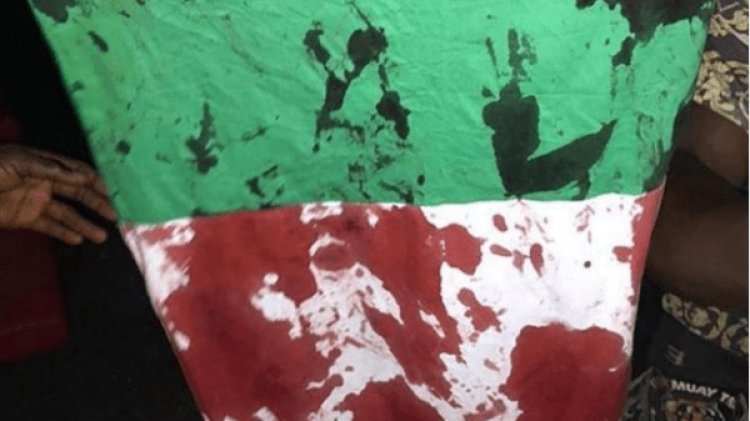Lekki Toll Gate Massacre: End SARS Protesters Killed As Soldiers Open Fire in Lagos
Black Tuesday as deadly violence comes hours after the announcement of a curfew in Lagos State on Oct. 20.

Numerous people were killed as Nigerian soldiers opened fire at a key protest site in Lekki, Lagos, witnesses said, as the government sought to end two weeks of marches against police brutality that have mushroomed into broader nationwide demonstrations.
Three witnesses, gathered among hundreds of protesters at Lagos’ Lekki toll gate, said that pickup trucks arrived shortly after nightfall and soldiers began to fire tear gas and then bullets into the crowd. It wasn’t immediately clear how many people had been killed, but each of the witnesses said they saw several bodies on the road. Videos posted on social media showed screaming protesters surrounding bloodied corpses, visible through a haze of yellow tear-gas smoke.
Oladotton Collins-Ebiesuwa, 49 years old, was at the toll gate when he heard automatic gunfire begin and began to run amid a crowd of protesters, according to Wall Street Journal.
“It was chaos. Everybody was running but then some tried to go back,” said the businessman, who has been protesting for days. “But we will continue. These people have been cheating us for so long.”
“The Nigerian government sent the army to come and kill us,” said Akinbosola Adeyemi, a talk-show host who ran five-eighths of a mile to safety. “A lot of people were hit. You are not meant to shoot live firearms against us.”
Nigeria’s army referred questions about the killings to the civil police, who couldn’t be immediately reached for comment. Nigeria’s national government also couldn’t immediately be reached for comment. The state government said it would open an investigation into the shooting.
The military force intervention came just hours after the governor of Lagos declared a curfew across Africa’s most populous city, saying that swelling protests against police brutality had “degenerated into a monster,” setting up a showdown between demonstrators and the government.
Recall, Babajide Sanwo-Olu announced on his Twitter handle that a curfew would come into effect at 4 p.m. local time on Tuesday and affect all parts of the state, which is home to more than 20 million people.
“Nobody except essential service providers and first responders must be found on the streets, we will not watch and allow anarchy in our dear state," the governor had said.
Tensions have escalated across Nigeria in recent days as violence has flared across several cities across southern and central states.
Armed groups—which demonstrators say were government agitators, a charge the government and its allies has denied—have clashed with protesters, property has been vandalized and in the southwestern Edo state, dozens of prisoners were freed in a jailbreak, prompting the state governor to impose a curfew.
The Lekki toll gate, situated at one of Lagos’ busiest intersections, has become a key rallying point for peaceful demonstrations in recent days, with food stalls, canvas tents and a private security detail patrolling the perimeter. DJs and Afrobeat stars have sung protest songs to young demonstrators waving their cellphones behind a large plasma screen beaming the slogan Soro Soke, or “speak louder.”
READ ALSO:
Celebrities React To Lagos State 24-Hour Curfew
The intervention comes after Monday protests where tens of thousands of demonstrators brought swaths of the commercial capital to a standstill, mounting the biggest demonstration in a two-week campaign against police brutality. A city police station was set on fire on Tuesday morning, leading the national police chief to order the deployment of anti-riot police to quell “increasing attacks including acts of arson and malicious damage.”
Lagos has emerged as the epicentre of a protest movement known as #EndSARS—it began with demands to disband a police force called the Special Anti-Robbery Squad that had been accused of extortion, torture and extrajudicial killings—that mushroomed into calls for broader complaints about corruption, poor governance and a weak economy.
Hours before the curfew began, hundreds of protesters remained at the toll gate, pledging not to move.
"This has become about much more than police brutality. It’s about our future,” said Stephen Adedoja, a 35-year old driver. “We have to make a stand before it’s too late.”





































